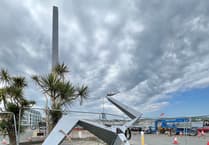Farming entrepreneur Stuart Meade is so passionate about spreading the word about Manx produce he holds tours at his Ballaugh base.
He and his wife Ruth run two businesses – Red Mie (Manx for ‘good things’) and Fire Island, which produces chillies.
Red Mie includes selling eggs and egg-laying chickens to smallholders or for pets.
It also rears native loaghtan sheep and has ducks and geese.
Another part of the business is organising visits to the farm, which began in 2019 and had to take a break during lockdown.
Stuart said: ‘Our visits are predominately built around chick- and duckling-rearing and our planting of fresh produce
‘In October it is about selecting ewes for breeding. Visitors get to come in and pick the ewe to go to the ram
‘We get to explain what makes a good ewe, what makes good Manx loaghtan.
‘They get to put their own unique number on the side of the ewe and then they can follow her progress and eventually come back in spring and see her birth her lambs, which actually happened last year.
‘We had a family who picked a ewe in the October and then when they came back in the spring, she actually gave birth while they were there.’
Lambing sessions go on sale on February 14. It is advanced tickets only but the price has not yet been announced.
‘We have been referred to as something of a Glastonbury,’ said Stuart.
‘Last year we sold out all our lambing sessions by 2pm on the day they went on sale.’
Families go to the sessions, although adult groups go as well.
‘We have chicks and sometimes ducklings and goslings, depending on the time of year and how things are going.
‘Obviously they lambs are there. If we have megs, visitors can bottle-feed the megs.
‘It is all about talking about the process and how we manage lambing and how loaghtans grow and develop, which is different from commercial sheep.
‘It’s all about getting an understanding and having honest conversations.’
Has understanding about farming diminished over the years?
‘What the Isle of Man has a better connection and understanding than certainly other places in the British Isles.
‘There is definitely a disconnect in urbanised areas of the UK and that’s always a risk.
‘There’s an issue for farmers, particularly around Tesco.
‘People don’t understand why something that is from the Isle of Man is expensive compared with something that’s in Tesco.
‘People want to do the right thing with high welfare standards, there is a disconnect over the true meaning of buying cheap and the knock-on effect of doing that.’
He said that everyone was aware of costs including energy costs.
‘We are getting hit by these costs and those costs also affect all our other imports that households don’t have as well
‘There has been a thing since the Tesco takeover of Shoprite, which I would say has been broadly applauded by the population. I think that’s highlighted where the issues are for people.
‘People want to support local. But in some instances they cannot.
‘We have to put across that it’s vital to have food security. People need to understand why it’s important and I don’t think some do.’
He said that the intense competition among supermarkets in the UK had led to a race to the bottom in terms of pricing. He said that if you squeeze prices, you either put businesses out of business or you lower standards.
‘What’s happening in the Isle of Man is we have incredibly high welfare standards,’ he said. ‘You won’t find any kind of caged birds, for example. All the eggs are free range. The birds are incredibly well looked-after.
‘We have to import everything to the island and that bit of water is incredibly expensive. Whether it’s seeds, whether it’s packaging, whether it’s labelling it all has to come across that water and it costs a lot of money.
‘We explain why our loaghtan sheep is more expensive than commercial lamb. It’s slow to grow and develop. A commercial lamb would be processed within the first 12 months of its birth
‘A loaghtan, because they’re slow growing, doesn’t develop for two or three years. As a result of that there is additional feed, additional health checks and shearing. They are additional costs.’
He said that the extra cost was worth it to preserve the species and also because of the taste - which he said was more like venison than lamb.
‘It’s not more expensive for no reason and no benefit.’
Red Mie doesn’t operate in isolation.
Its hen’s and duck eggs predominately go to Woodbourne Deli in Douglas, which featured in the Examiner recently, and are sold directly.
‘They are a fantastic outlet, very supportive of local produce,’ Stuart said.
He and Ruth also sell a lot of the loaghtan through Robinson’s.
‘They are excellent supporters of local,’ he said. ‘They have been very helpful to us.’
Meanwhile, the couple’s Fire Island business, operated from the farm, is expanding.
They are installing two more polytunnels.
‘The response to hot sauces has been absolutely incredible,’ Stuart said.
‘We do a range of hot sauces all made here in the island with our own chillis grown from seed. We had 500 plants last year we are going to 1,600 plants this year.’
Fire Island is only Manx chilli farm. It sells fresh chillies direct to customers, retailers and restaurants and produces its own range of hot sauces, hot honey, dried chillies and other related products.
They have a curated range of 45 different types of chilli plant from all corners of the world.
What inspired them to begin?
Stuart said: ‘We love cooking and are inspired by different foods from all over the world and chilli peppers are a key ingredient in so many of the dishes we enjoy.
‘They’re not just about the heat, there’s so much variety not only in the ways they can be used but the flavours, from smoky to sweet to tropical and being able to grow them right here on the Isle of Man means you can locally access types and tastes that are usually incredibly hard to find.’



-(1).jpeg?width=209&height=140&crop=209:145,smart&quality=75)
